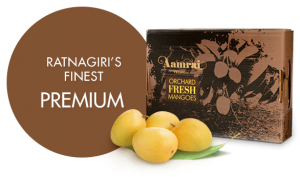Alphonso Mangoes
Known for its delicious flavour, aromatic pulpy texture and saffron colour, the Alphonso mango is considered to be the king of Indian fruits. It is a highly prized cultivar in domestic and international markets, with exports going to countries like Japan, Europe, the USA, West Asia and recently, Australia too.
However, Alphonso is a high-priced Ratnagiri Alphonso Mango that can be a tough sell in the retail market given the way people tend to pay based on weight rather than a dozen. A dozen mangoes can cost anywhere between Rs 2,000 and 4,000 depending on the quality and variety of the fruit.
While there are a number of factors that influence the price of the fruit, one of the key reasons is the weather. The state is usually blessed with a warm summer and an average monsoon, which leads to an ideal season for Alphonso production. However, the weather this year has been unseasonal and impacted the crop.

Alphonso Mangoes – The King of Indian Fruits
This has led to a shortage of the mango, driving up the prices. However, farmers say that the situation is better than last year. The first flush of the fruit arrives in October-November, accounting for 15-20 per cent of the total harvest. The second flush comes towards the end of the month and accounts for another 30-35 per cent. The third and final wave occurs from mid-January to the second half of February, resulting in the maximum yield.
Despite this, farmers are optimistic that the prices of Alphonso will fall in the coming days. However, this will also depend on the weather conditions. Moreover, the demand for the fruit is growing in the international markets as well. This is leading to a higher export price and hence a lower domestic price for the mangoes.
In addition, the farmers also face a challenge with the wholesale rate that is charged by retailers. Most of the time, these mangoes are not grown in Maharashtra but are brought from states like Karnataka and Kerala by the wholesalers on a ‘per kilogram’ basis. This results in consumers being tricked into paying more for the fake Hapus.
The best quality of the mangoes is from the Devgad region of Ratnagiri. However, this variety is more expensive than the normal ones from the state due to the climatic conditions and a longer cultivation period. However, buyers should be cautious about the seller and buy only from a reliable source to ensure that they are buying the real deal. Moreover, the buyers should inspect the mangoes properly and make sure that they are not chemically ripened or sprayed with any chemicals. It is also important to keep them properly stored in a box with hay at 18-25* temperature (keep them in air conditioning if ambient temperatures are higher) until they turn yellow. This will give them the right aroma and taste. The mangoes are shipped Green and will need to be kept in a cool and dry place to withstand the transportation time, courier handling and heat.